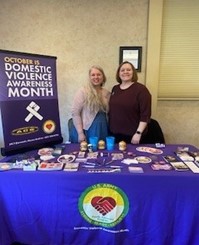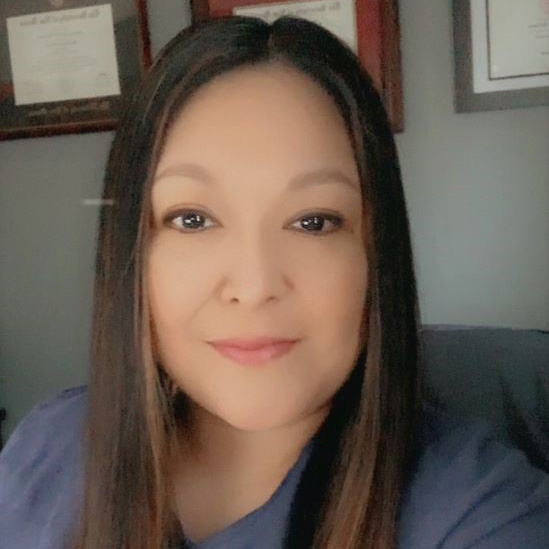October is Domestic Violence Awareness Month. The IHS Domestic Violence Prevention Program grant recipients have been organizing and conducting prevention activities in their tribal communities to raise awareness about the serious public health issue of domestic and intimate partner violence. To address this issue, the IHS DVP program is currently funding 37 grant recipients for a five-year funding cycle from 2022 –2027. Below are a few examples of how programs and communities are addressing this difficult matter in unique and motivating ways with the help of tribal members and community partners. For more information on the IHS DVP program grant recipients and the work they are doing, please visit our webpage that provides project summaries of current grantee work.
Bemidji Area – Pokagon Band of Potawatomi Victim Services Department
In the Bemidji Area, the Pokagon Band of Potawatomi Victim Services Department “For Kids’ Sake” program is providing comprehensive support for victims of domestic violence, including case management, safety planning, court accompaniment, and outreach. What sets this program apart is its focus on providing domestic violence services to both adults and children. The program offers monthly, age-appropriate domestic violence education to the Pokagon Band preschool program, Zagbegon Early Learning Development Academy. Whether helping children directly affected by domestic violence or offering preventative education, the Pokagon Band Victim Services Program embraces domestic violence prevention being a shared responsibility of the entire community.
Great Plains Area – Tuolumne Band of Me-Wuk Indians Social Services Department
On October 16 in the Great Plains Area, the Tuolumne Band of Me-Wuk Indians Social Services Department co-hosted a “Day of Healing – Meditation and Beading”. During the event, participants had access to traditional items to support the creation of medicine bags. Over the past three weeks, program staff have distributed more than 300 pledges to tribal community members and local county agencies and asked participants to wear purple on October 17 to support survivors of domestic violence, in addition to speaking up and speaking out against domestic violence.
Albuquerque Area – East Mountain Resource Center
The East Mountain Resource Center is managed by the Mescalero Apache Tribe in New Mexico. The purpose of their domestic violence grant program award is to expand domestic violence outreach in the Mescalero Apache area. The project currently offers advocacy services, education, and awareness to tribal community members and community partners through traditional services for healing, resilience, cultural immersion, and family bonding. Education and awareness activities and training involve law enforcement agencies, tribal divisions and departments, schools, and community health fairs. Two awareness activities during October included a cultural healing presentation to the local incarcerated population, and collaboration with the community health representative program to promote the domestic violence prevention and awareness walk on October 17.
Nashville Area – Cherokee Indian Hospital
Throughout October, the forensic nursing program at the Cherokee Indian Hospital in Cherokee, North Carolina, highlighted the accomplishments and successes of their program. The program began with two nurses and has since been training to establish six forensic health care nurses. The program has grown their forensic health care services to include two neighboring counties’ health care services that serve tribal communities. The program has educated and trained the Cherokee Indian Hospital staff, tribal entities, tribal police, and judicial and prosecution team members on recognizing the signs of human trafficking. It continues to educate and bring awareness to the five surrounding counties and their communities through tribal newspaper and social media, sharing and ensuring a presence at community events, and community resource program meetings. The program also works with local colleges and university campus police, providing education on intimate partner violence, consent, and sexual assault awareness to new incoming students. A domestic violence prevention committee was developed and implemented at the Cherokee Indian Hospital and works to educate staff and the local community on what intimate partner violence is and what services are available.
Alaska Area – Fairbanks Native Association Community Services
In Alaska, the Fairbanks Native Association Community Services hosted a Domestic Violence Awareness Month “Lunch 'n Learn” event on October 2 that featured informational booths and presentations from key speakers in the field. Danielle Redmond, prevention coordinator for the Alaska Department of Public Safety, Council on Domestic Violence and Sexual Assault, provided insights into resilience and hope among domestic violence survivors. Kristen Farleigh, an associate attorney from Jason Weiner and Associates Law Firm, discussed legal aspects surrounding domestic violence cases. Paige Metzgar, licensed professional counselor from Grace in Motion Counseling, also shared a counseling perspective, emphasizing the importance of mental health support for victims of domestic violence. The event aimed to educate and empower the community on domestic violence awareness and available support services.

Domestic Violence Awareness Event in Fairbanks, Alaska



